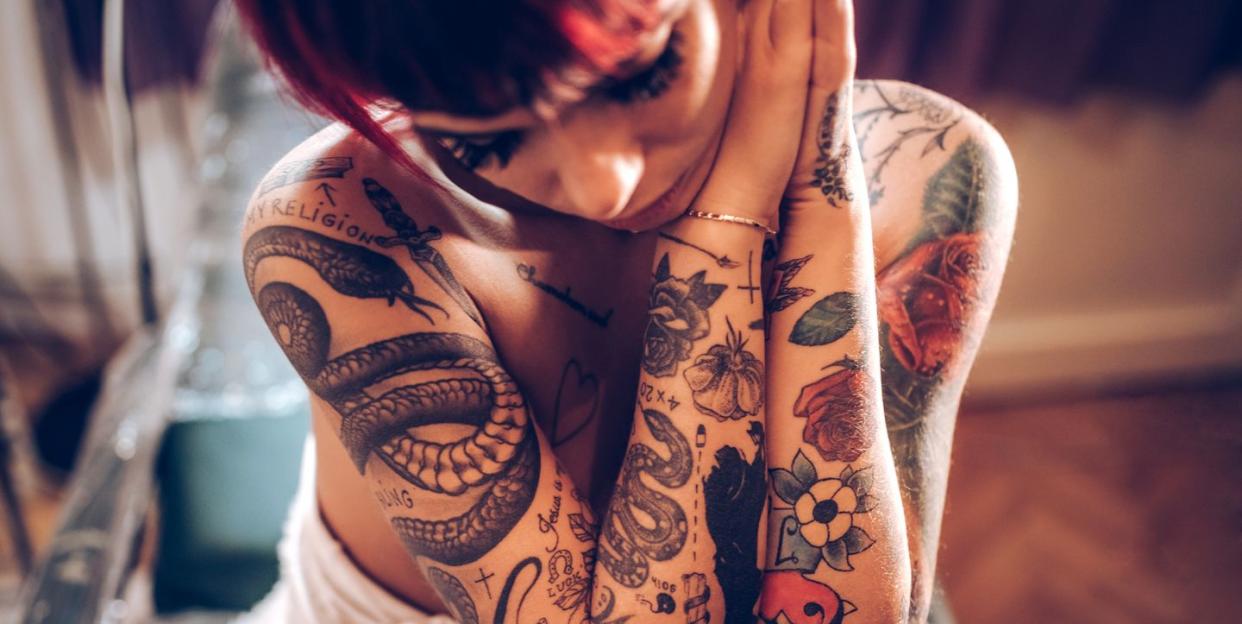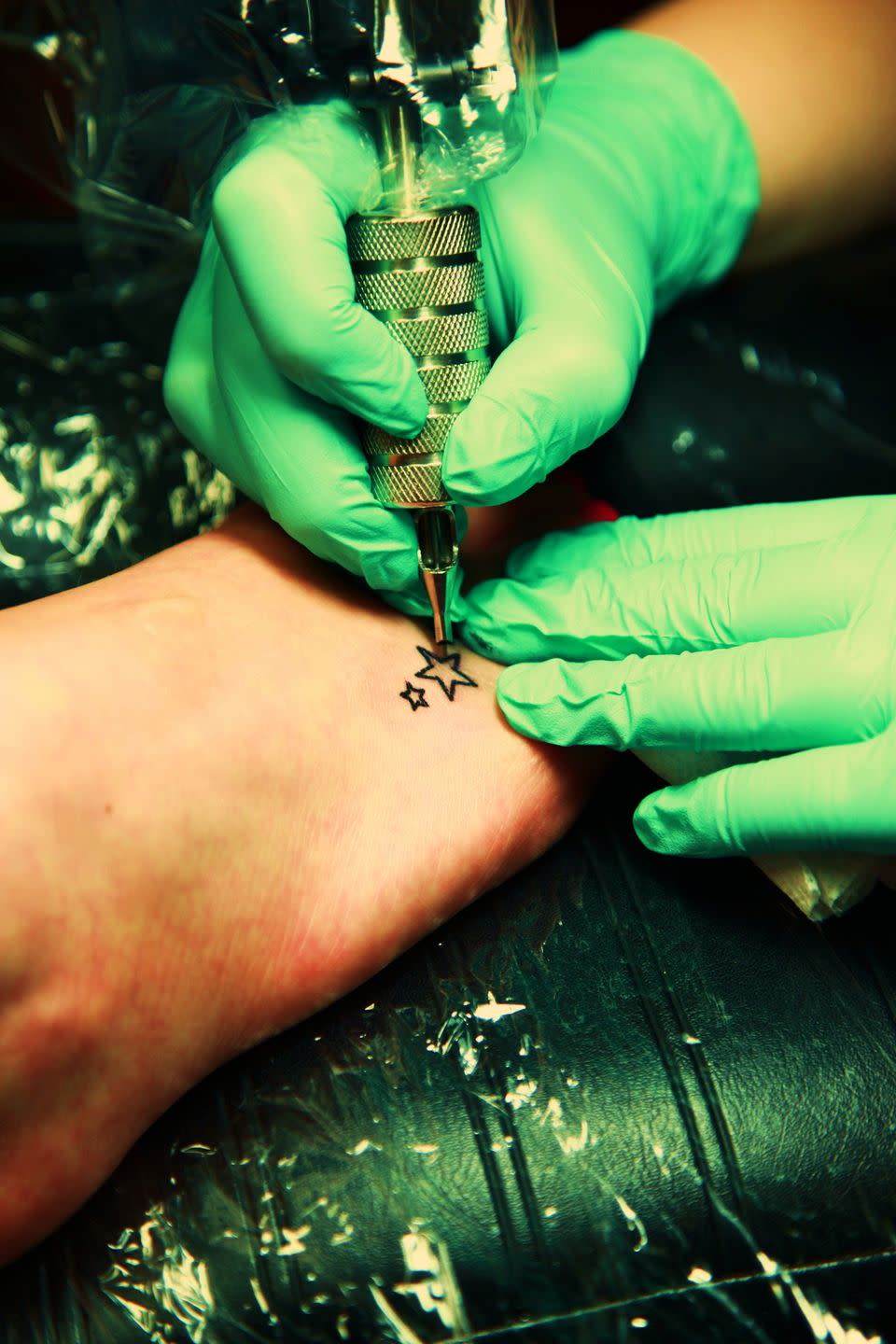How to care for your new tattoo

Having a tattoo is about more than just choosing a design and finding an artist you admire – to make your ink look great and retain its colour for the long-term, you need to make sure your aftercare is spot-on too.
Any licensed and reputable tattoo artist will tell you exactly how you should look after a new tattoo on the day, but in case you were too nervous/excited/worried to pay full attention, we explain how to get the best from your new tattoo.
We speak with two tattoo artists – Josh McAllister of Horizon Tattoo Company and Chris Acaster of Studio 31 - plus Doctor Clare Morrison, GP & Medical Advisor at Medexpress, to make sure you have every element of your ink aftercare covered, and can get on with the most important part of getting a tattoo: showing it off with pride.
Tattoo aftercare day 1
• How to care for a new tattoo immediately afterwards.
While new tattoos (hopefully!) look great, because a needle is used to insert ink beneath your skin, having one done is technically also a medical procedure. Similar to an open wound, tattoos require careful aftercare to avoid scarring and infection, so always wash your hands before caring for your unhealed tattoo.
When you first leave the tattoo parlour, they will clean it and wrap it in clingfilm. Leave this on until you get home. 'Cling film should left on for 6-7 hours after the tattoo,' explains McAllister, 'then the tattoo should be cleaned down with warm water immediately after unwrapping it, and then dried and re-wrapped for bed until the following morning.'
'Once the clingfilm is removed, wash with warm, fragrance-free soapy water,' agrees Acaster.' Pat dry using kitchen roll or something that's not going to fall apart when wet and leave anything on the tattoo, and then apply a thin layer of Palmer's cocoa butter moisturising lotion.'
When you first wash your new tattoo it will probably ooze colourful fluid. This is a mixture of blood, plasma and ink and is perfectly normal. Your skin will also be sore and might feel warm to the touch, similar to sunburn.
'We recommend the cream being reapplied little and often rather than bathing it in cream and leaving it for the day,' advises Acaster. 'Every time you reapply the cream you should fully clean off the old cream before reapplying, then rinse and repeat until fully healed.'
Tattoo aftercare day 1-3
• How to care for a new tattoo over the first few days.
While tattoo artists may offer slightly differing advice, using clingfilm for the first few days before it is fully healed will keep your new tattoo safe from infection - and it's also handy for preventing the excess ink from transferring onto your clothes and bedsheets.
'For the first 2-3 days, keep the tattoo covered with clingfilm,' advises Dr Morrison. 'This should be changed at least three time a day. Before re-applying, gently clean the tattoo with water.
'Clean the tattoo before each application of moisturiser for the first 2-3 days,' she adds.

Tattoo aftercare day 3-7
• How to care for a new tattoo over the first seven days.
Similar to caring for an open wound, it's important to maintain a high level of personal hygiene while your tattoo heals to prevent infection, so continue to wash your hands with warm soapy water before tending to your new tattoo.
Over the first week to 10 days you will probably notice some light scabbing. Resist the urge to pick them as this can cause scarring and colour gaps. 'Moisturiser can be used 4-5 times a day for 2-3 weeks to help the tattoo heal fully,' advises McAllister.
'For the first two weeks moisturise 2-3 times a day with a product specialised for tattoo care,' agrees Dr Morrison.
Tattoo aftercare day 7-14
• How to care for a new tattoo over the first fortnight.
Once the scabs begin to flake off, resist the urge to scrub at them and let the skin flakes come off gently in the shower.
Around about this time you might start to itch like mad! It will take a lot of willpower to resist the urge to scratch, but it's important that you leave it alone. This is part of the healing process, so gently apply moisturiser and grit your teeth until the itching subsides.
⚠️ If your tattoo is still red, swollen or oozing liquid at this point, make an appointment with your GP as it may have become infected.
Should you use Bepanthen on a new tattoo?
Traditionally tattoo artists recommended Bepanthen, a type of barrier cream used for nappy rash, to care for your new tattoo but modern artists do not advise this.
'Bepanthen isn't recommended for tattoo care, as it can cause a marbled effect on the tattoo,' says Dr Morrison. 'It can also block pores, and cause a reaction. It's best to use a product specially designed for tattoo aftercare. This will ideally be fragrance-free, protective, anti-itch, and help to maintain colour.'
Acaster agrees, explaining: 'I personally don't recommend Bepathen, but Palmer's Cocoa Butter or even Dream Cream from Lush I've used frequently and never had an issue with.'
Can you shower after having a tattoo?
It goes without saying that long soaks in the bath and swimming are not recommended in the first few weeks after having a tattoo, but it is OK to shower as normal.
'Showers are fine, just avoid scrubbing the area or getting it covered in soapy water for too long,' says McAllister – and Acaster agrees. 'It's completely fine, but I wouldn't advise anyone to completely submerge a new tattoo underwater, especially for long periods of time, as that does affect the healing – but running water over it will be okay.'
How do you retain your tattoo colour?
According to the experts, the colour vibrancy depends on your tattoo artist and the quality of ink used. Thankfully, there are steps you can take to keep your ink looking fresh.
'Avoid direct sunlight when possible, and moisturise as much as possible to help colour tattoos age well and stay bright,' says McAllister. 'This applies for years to come, not just during the healing process.'
Dr Morrison echoes these sentiments, encouraging people to avoid sunbathing wherever possible, while Acaster explains: 'Retaining the colour is more down to the artist. So, do your research and so long as their work is good and you look after it properly, your colour should be as good as the day it was put in for as long as possible.
'Do your research and find someone who does what you are after, and you'll get much better results.'
You Might Also Like


